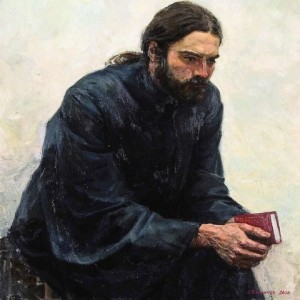Philokalia Ministries
Episodes
Thursday Nov 08, 2018
The Ascetical Homilies of Saint Isaac the Syrian - Homily Fifty-one Part I
Thursday Nov 08, 2018
Thursday Nov 08, 2018
Tonight we began reading homily 51. To say it was challenging is an understatement. Saint Isaac presents us with the gospel in its purity and challenges us to abandon our comfortable and limited perception of the truth; in particular our understanding of mercy and justice. Isaac, in stark terms, tells us that rash zeal and fanaticism have no place in the spiritual life and in our relationships with others. We are not allowed to give way to our desire to judge others according to our own sensibilities. We are to put on the mind of Christ and our love for others is to be cruciform.
Very often we take a morbid delight in assuming the position of power within relationships, enjoying correcting others when in reality we only add to their suffering. Furthermore, our rebuke of others only has the effect of undermining our own spiritual lives. Isaac bluntly tells us that to judge another is like a father slowly strangling his own beloved son.
We can only understand Issac’s teachings from the perspective of the life of Grace and Theosis. We must be conformed to and transformed by Divine Love in every way.
In the weeks and months to follow, St Isaac will draw us deeper into the mystery of God’s mercy and the beauty of the human person made in His image.
Thursday May 11, 2017
The Ascetical Homilies of Saint Isaac the Syrian - Homily Six Part III
Thursday May 11, 2017
Thursday May 11, 2017
Last evening we picked up midway through Homily Six where St. Isaac takes up the topic of the vision of the divine in the Kingdom. Such vision and its nature is predicated on the individuals degree of perfection and its gifts. Yet, Isaac is quick to remind us that there is no division amongst us and the experience of God despite how this experience is perceived. There is no disunity or division in heaven and no comparison of gifts. Each delights in the experience and continues to be drawn into the fullness of God.
Following upon this, St. Isaac would have us understand that there exists only Gehenna and Heaven and no other state. It is foolhardy to propose an in-between state that is somehow greater than Gehenna but not yet the Kingdom. Such a notion speaks of an individual's hope that the one can live this life without a sense of urgency rooted in our ultimate end. Every moment is freighted with destiny because every moment is an opportunity to love - an opportunity embraced or set aside. To propose anything less is to foster false hope as well as mediocrity and lukewarmness.
A rather lengthy discussion ensued about the differences between Eastern and Western spirituality; in particular the use of discursive mediation and the use of imagination among Western writers and the avoidance of it among the Eastern ascetics. While largely a part of our spiritual patrimony those in the West have not been catechized in the Ascetical theology and practice of the East and the understanding of the active life as being rooted in the purification of the passions and the development of unceasing prayer. The understanding of the Church as a hospital and a place of healing and Christianity being an Ascetical religion has largely been neglected in recent generations as well as its impact on our understanding of liturgy, religious art and life as a whole.

Wednesday Mar 16, 2016
Wednesday Mar 16, 2016
Cassian and Germanus now begin their discussion with Abba Theonas; the conference beginning with the story of Theonas' own conversion and which is meant to be the cypher through which the teachings that follow are meant to be interpreted. There is a higher ideal of the Gospel - one that urges a far greater abnegation of self than what is found the the fulfillment of the law. Furthermore, one is called, persuaded, to respond to the higher life of grace and is invited to assent through freedom of will and the desire for what is beautiful. The perfect who stand not under the law but under grace, remain ardent, and so attain to that state where they are not dominated by sin. They are not content to offer tithes but rather seek to offer themselves and their own souls to God, for which no exchange can be made by a human being. Christ forces no one to the highest reaches of virtue by the obligation of a precept but he moves by the power of a free will and inflames by salutary persuasion and by the desire for perfection.

Thursday May 28, 2015
Conferences of St. John Cassian - Conference Thirteen On God’s Protection, Part I
Thursday May 28, 2015
Thursday May 28, 2015
Last night the group took up Cassian's Thirteenth Conference "On God's Protection" which discusses the essential interplay between Grace and Free will. Part of our close reading of the text allows for a "redeeming" of Cassian's understanding of this delicate subject from what has been, I believe, gross misrepresentation of this thought. When read in light of and in the context of the Eastern Christian spiritual tradition and its understanding of SYNERGY, Cassian's Conference is revealed as being the most refined and beautiful explication of difficult subject matter, based upon the lived experience of the ascetical life. It also highlights the importance of the Eastern view of theology as an experiential knowledge of God rooted in purity of heart and the life of prayer and not simply being a rationalistic approach to the mysteries of the faith.

Wednesday Jan 22, 2014
Ladder of Divine Ascent - Step 29 On Dispassion Part II and Step 30 on Love
Wednesday Jan 22, 2014
Wednesday Jan 22, 2014
Dispassion:St. John's words in this chapter are a wake-up call. They remind us of how far we are from spiritual perfection. They humble us. They motivate us. They set the goal before us. The goal is high: dispassion leading to illumination. The height of the goal reaffirms the necessity of struggle. Nothing in this life comes easily. The more important it is, the more work it requires. Thus, in our spiritual lives, when we are tempted to despair, to quit, to accept second best, to abandon the struggle, we must remind ourselves of just how wonderful the prize is. St. John says: "Think of dispassion as a kind of celestial palace, a palace of the king of heaven." This is where we must want to dwell. A small hut may be easier to attain, but it is not where those zealous for God and wish to be near him want to live. They have their eyes set on something more. "Blessed dispassion raises the poor mind from the earth to heaven, raises the beggar from the dunghill of passion. And love, all praise to it, makes him sit with princes, that is with holy angels, and with the princes of God's people." Love: As we remarked in the very beginning of our study, the Ladder of Divine Ascent is a way to union with God. This is the goal of the spiritual life: direct, unhindered and undistracted communion with the Holy Trinity. Everything that St. John has outlined, the negative and the positive, has been presented with this goal in mind: to prepare ourselves to know God and, in knowing God, to experience Eternal Life. What is the highest pinnacle of the knowledge of God? When is our labor no longer preparation for, but actual enjoyment of the presence of God? St. John answers: "when we love." He writes: "Love, by its nature, is a resemblance to God, insofar as this is humanly possible. In its activity it is inebriation of the soul." In another paragraph he explains: "Not even a mother clings to her nursing child as a son of love clings to the Lord at all times." In still another place, he writes: "Love grants prophecy, miracles. It is an abyss of illumination, a fountain of fire, bubbling up to inflame the thirsty soul. It is the condition of angels, and the progress of eternity." It is truly significant that St. John isolates love as the highest expression of spirituality. For those of us who have grown up in the West, we have tended to associate great spiritual progress with either intellectual achievement or social action. Neither of these is antithetical to the spiritual life, but neither represents its highest attainment either. The person who truly knows God is love even as God is love. This too is an important consideration. We all from time to time love. Love is something we do and something we give. At best, love is an "attribute" which is part of our inner selves. In this respect, for us, love is most often "premeditated." We think and plan to love. This is the beginning of the spiritual life. Those fully deified do not "love" as an expression of forethought or will, but they themselves have become love. Here is where true union with God takes place. To know the heart of God is to know love. "Love" is not an attribute of God, which takes its place among the other "attributes" of God. Love is God and God is love. Everything He does, even His punishment and wrath against sin, is an expression of His love. To love is to be obsessed by and with the thing or person which is loved. The deified ones are completely overtaken by desire for God Himself. St. John explains: "Someone truly in love keeps before his mind's eye the face of the beloved and embraces it there tenderly. Even during sleep the longing continues unappeased and he murmurs to his beloved." This kind of consuming and exhilarating love for God is a gift, a grace, which comes from Him. This is the mystical side of the spiritual life. We can prepare ourselves to receive God's love; this is the ascetical side. But true love comes from God and draws us back to God. Having ascended the Ladder through the practice of the virtues, at its pinnacle, we encounter the Eternal Mystery, we are drawn into that Light which is also Darkness and that Darkness which is also Light and we learn the meaning of the parable: "We love because He first loved us." We encounter Someone bigger, more powerful and more real than all of our feeble attempts to understand Him. We find the End of our search, and in experiencing Him, realize the End to be simply the Beginning.

Wednesday Jan 08, 2014
Ladder of Divine Ascent - Step 28 On Prayer Part I
Wednesday Jan 08, 2014
Wednesday Jan 08, 2014
As we noted in the beginning of our study of The Ladder, the goal of all spiritual labors is communion with God. We do not seek an abstract vision of the Divine, nor do we labor for a legal verdict declaring us "not guilty." Rather, we aim at communion and union; we set our sights on the true, intimate knowledge of God which is "life eternal" (John 17:3). According to St. John, prayer must be looked at as both the means to and the achievement of this knowledge. The goal of prayer is God. This is important to note as we begin. In prayer and through prayer we seek Him. How easy it is for us to reduce prayer to the fulfillment of some external "rule of prayer" which must be completed before we can continue on with the fulfillment of our other "external" requirements. The great tragedy of our spiritual lives is that prayer itself can become part of this "world and its ways" rather than an abandonment of this world so as to pursue the next. "Rise from the love of the world and the love of pleasure. Put care aside, strip your mind, refuse your body. Prayer, after all, is a turning away from the world, visible and invisible. What have I in heaven? What have I longed for on earth besides You? Nothing except to cling to You in undistracted prayer. Wealth pleases some, glory others, possession others, but what I want is to cling to God and to put the hopes of my dispassion in Him" Understood in this light, prayer thus is itself a means of purification and of judgment. "War reveals the love of a soldier for his king, and the time and practice of prayer show up a monk's love for God. So your prayer shows where you stand." Prayer is a mirror, showing to us the true nature of our desires and of our love. If we love God, we will love to pray. The stronger the love for God, the greater our hearts will be drawn to the dialog of prayer, the more He will be the object of our thoughts and desires, the more He will consume us and become the end of our struggles. Prayer has its external aspects: the words, the discipline, the posture, the knots on the prayer rope. But these external aspects must find their realization in the internal state of our soul. St. John outlines a continuous method of prayer which incorporates both of these: "Get ready for your set time of prayer by unceasing prayer in your soul." For the true struggler for God, prayer is not episodic; it is a way of life. Its external expression changes: sometimes it is the reading of psalms, other times the singing of hymns, still further it may be the quiet saying of the Jesus prayer or the recollection of God in the fulfillment of our daily tasks. Gradually, prayer itself establishes its own rhythm in our lives. In the beginning we force ourselves to pray; in the end it is prayer itself which forces us. For those who are beginning the spiritual life, prayer requires hard work. Here the external aspects of prayer dominate. We can only learn to prayer one way: by doing it. And by doing lots of it . . . over and over again, training our hearts to recognize and feel the words spoken by our mouths and considered in our minds. We force ourselves to practice. Very often this seems strange and foreign to us. It does not seem natural; we totter and stumble. We finish our prayers and feel as if we have simply said "words" without really praying them. We may often feel "hypocritical" in our prayers, as if they are external and therefore fake. This is the beginning of prayer. If we persevere, pushing ourselves to say the words and urging our hearts to join the mind and the mouth, prayer will become internalized. Prayer will not be something which comes from the outside, but it will come from the inside out. The words will flow from our hearts, rather than off the page. We will still say and think the same words, but these words will be ours, rather than someone else's. Our mouths, minds and hearts will be one. Our being will be united in prayer. This is the middle stage of prayer. If we persevere in this, not allowing our hearts to become distracted, the experience of prayer becomes so much a part of us that the words themselves fade away and prayer becomes ecstasy and the immediate presence of God. This is the third and final stage; this is deification, the heights of theosis, to which only the saints rise in this life. As we struggle to pray, there are several attitudes which we must be careful to maintain. The first is humility. Satan tries to rob us of our humility during prayer by taking away from us the simplicity necessary to true prayer. He divides us by getting us to think about ourselves even as we are praying. We observe ourselves from the outside, thinking about how well we are praying, how long we have been praying, etc. To pray is to lose ourselves in God; it is to abandon the pursuit of self by pursuing God. Satan also tries to rob us of our humility after we pray by telling us how good we are and how effective and powerful our prayers are for others. Once again, notice how he tempts us to externalize our prayer and to focus not on God, but on ourselves as "pray-ers" The truth is: we cannot pursue God so long as we think about ourselves. Another important attitude necessary for true prayer is gratitude. St. John advises: "Heartfelt thanksgiving should have first place in our book of prayer." All prayer to be true prayer must be eucharistic. This means that prayer must flow out of a thankful heart. Before it becomes intercession, prayer is first a response to grace received. A thankful heart is of necessity driven to give thanks. It cannot remain silent, but is must communicate its thankfulness to the Source of all blessings. Still further, for our prayer to lead to union with God, it is always necessary for it to be offered in a spirit of contrition. St. John notes: "Even if you have climbed the whole ladder of the virtues, pray still for the forgiveness of sins." If we ever appear in God's presence and think that we belong there, if we ever lose sight of the priority of grace and our need for it at all times, then we have lost prayer. It is for certain that we are not talking to God but only to ourselves or worse yet to Satan who has the capacity of transforming himself into an angel of light. Contrition is the key to being delivered from spiritual delusion. Those who pray in a spirit of repentance are not easily fooled by Satan and his demonic hosts. Finally, and perhaps most important of all, we must understand that prayer is not something gained simply from the teaching of others. St. John writes: "You cannot learn to see just because someone tells you to do so. For that, you require your own natural power of sight. In the same way, you cannot discover from the teaching of others the beauty of prayer. Prayer has its own special teacher in God. He grants the prayer of him who prays. And He blesses the years of the just."

Wednesday Apr 03, 2013
Nous Part Ten - Theoretic Nous and Deified Nous
Wednesday Apr 03, 2013
Wednesday Apr 03, 2013
Theosis and Deification - "Mind that sees God"; cannot reached blessed state unless passing through practical stage of asceticism and purification; fixed and faultless movement between nous of man and Nous of God; joy that comes through theosis; seeing God's virtues in self.

Wednesday Mar 13, 2013
Nous Part Seven - Prayer That Transcends the Passions and Conceptual Thoughts
Wednesday Mar 13, 2013
Wednesday Mar 13, 2013
Prayer and the Apophatic tradition; imageless and without conceptual thoughts or the use of imagination; perceived and real differences from Western Spirituality; purification of the Nous essential for salvation; signs of such true prayer; virtue alone does not lead to God; how prayer binds us to God